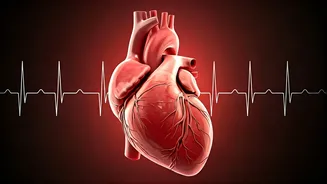Know Cardiovascular Age
Understanding your cardiovascular age is the initial and perhaps most crucial step in ageing well. Unlike chronological age, cardiovascular age reflects
the condition of your heart and blood vessels. Knowing your cardiovascular age allows for a personalized approach to health. It involves regular check-ups, including blood pressure monitoring, cholesterol tests, and potentially more advanced assessments. This information helps to identify and address risk factors early on. This proactive approach allows you to make informed decisions about your lifestyle and medical interventions, empowering you to manage your heart health more effectively. It gives a baseline to improve, providing a clear picture of how lifestyle choices influence heart health, and sets the foundation for tailored strategies that can significantly extend your healthy lifespan.
Train Heart Like Muscle
Just as muscles benefit from exercise, the heart also responds positively to training. Regular physical activity is critical for maintaining a healthy heart. Engaging in both aerobic exercises, like running and swimming, and resistance training strengthens the heart muscle, making it more efficient. Aerobic exercises improve cardiovascular function by enhancing the heart's ability to pump blood and improving oxygen utilization. Resistance training helps to build muscle mass. These exercises help regulate blood pressure, improve cholesterol levels, and reduce the risk of heart disease. Incorporating a mix of activities into your routine creates a comprehensive approach to heart health. Consistent exercise doesn't just improve physical fitness; it has a significant impact on overall health and longevity.
Boost Nitric Oxide Naturally
Nitric oxide (NO) is a molecule that plays a crucial role in cardiovascular health by relaxing blood vessels, improving blood flow, and reducing blood pressure. Boosting NO naturally can significantly benefit your heart. Certain foods, such as beets, leafy greens, and garlic, are rich in nitrates, which the body converts into NO. Regular consumption of these foods can increase NO levels and improve vascular health. In addition to diet, exercise also plays a role in enhancing NO production. Physical activity stimulates the release of NO, further improving blood flow and cardiovascular function. Strategies like eating nitrate-rich foods and regular exercise offer a natural and effective way to promote heart health and overall well-being. Focusing on these strategies could help you improve heart function.
Lower Silent Inflammation
Chronic inflammation, often unnoticed, contributes to various health problems, including heart disease. Lowering inflammation is key to ageing better. Inflammation can be reduced by adopting a healthy diet rich in fruits, vegetables, and omega-3 fatty acids, while minimizing processed foods, sugar, and unhealthy fats. These dietary choices provide essential nutrients and antioxidants that help to counter inflammation. Regular exercise is another effective way to combat inflammation, with regular activity reducing inflammatory markers and improving overall health. Adequate sleep and stress management also play important roles, as chronic stress and poor sleep can exacerbate inflammation. By incorporating these lifestyle changes, you can actively reduce inflammation, promoting a healthier and more resilient body.
Test, Don't Guess
Making informed health decisions is vital, so testing is necessary. Understanding your body requires data, not assumptions. Regular check-ups with your doctor, including blood tests and other assessments, provide valuable insights into your health status. These tests help identify potential issues early on, allowing for timely intervention and preventative measures. Cardiovascular screenings, such as blood pressure and cholesterol level checks, are essential for monitoring heart health. This data helps assess risk factors and track progress over time. Using available information, you can make the right decisions about your health, enabling proactive management and preventing health problems before they become serious. This approach ensures you remain in control of your health.
























